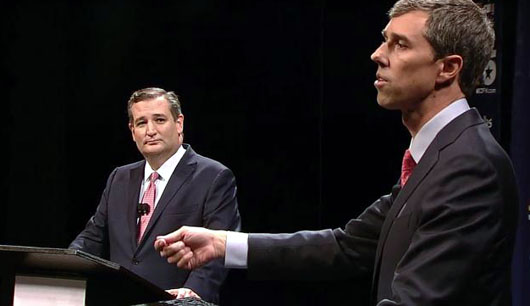by WorldTribune Staff, October 19, 2018
Faculty and staff at the eight Ivy League universities as of Oct. 1 had contributed more than $190,000 to Democrats in eight midterm election races that are considered toss-ups, a report said.
Only one Republican received an Ivy infusion – Sen. Ted Cruz got $750 from a Yale librarian.

“That’s a ratio of more than 250-to-1, even higher than the 90-1 Democratic lean of the Ivies during President Obama’s re-election campaign in 2012,” James Varney noted in a report for The Washington Times, citing statistics from the Center for Responsive Politics’ OpenSecrets database.
The Ivy League haul for Beto O’Rourke, Cruz’s opponent in his re-election bid in Texas, is $30,000.
“The Ivy League may be the most extreme, but it is far from alone among higher education in preferring Democrats.”
O’Rourke has taken in nearly $130,000 from the University of Texas at Austin alone, compared to $22,399 for Cruz.
The dynamic is at play in nine of the most hotly contested Senate races – Arizona, Florida, Indiana, Missouri, Montana, Nevada, North Dakota, Tennessee and Texas – where the ratio of college and university giving to Democrats versus Republicans averages about 10-1 and in some cases exceeds 90-1, Varney noted.
“I don’t think it’s a healthy situation, this radical disparity between liberal and conservative on these campuses,” said Peter Wood, president of the National Association of Scholars.
“Writing a check is a step toward deeper activism,” Wood said. “When it becomes so lopsided, it can compromise public trust in universities, especially the public universities where you would think there might be some rough approximation of what we see in the population, and yet there’s no sign of that.”
Varney noted that all contributions from universities’ faculty and staff are legal. The American Association of University Professors’ guidelines make no mention of such political activity in its Redbook section on professors and political activity.
Although the association urges members to seek a leave of absence should they engage in “extensive campaigning for elective office,” academic freedom demands “they should be free to engage in political activities so far as they are able to do so consistently with their obligations as teachers and scholars.”
In Missouri, Sen. Claire McCaskill has taken in more than $830,000 on the college circuit, and three schools appear in her top 20 list of contributors’ employers in Open Secrets’ data.
McCaskill lists contributions from 36 institutions, including a whopping $336,989 from Washington University in St. Louis.
McCaskill’s Republican opponent, Josh Hawley, has collected a total of $20,000 from college employees, including $6,950 from Washington University employees and $8,150 from the University of Missouri.
Sen. Joe Donnelly, an Indiana Democrat in another tight race, counts Indiana and Purdue university employees among his 10 biggest contributors and in college money has outraised his Republican opponent, businessman and former state representative Mike Braun, by a margin of more than 25-to-1, Varney noted.
“Joe for Indiana” press secretary Kate Oehl said the senator has worked on college employees’ issues.
Republican candidates said they are not surprised that academics – particularly those from out of state – are contributing to Democrats in races such as Nevada, where Democratic challenger Jacky Rosen has two colleges among her top 10 contributors, while Republican Sen. Dean Heller doesn’t have any in his top 100.
“Jacky Rosen’s campaign has been completely created and propped up by out-of-state liberals,” said Heller campaign spokesman Keith Schipper. “She is bought and paid for, and this is just another example of the progressive elite trying to buy a U.S. Senate seat in Nevada.”
Among nearly 50 universities that The Washington Times examined, the employee donation breakdown was 86 percent to Democrats and 7 percent to Republicans.
Wake Forest University employees were the most balanced group that The Times reviewed, breaking down between Democrats and Republicans by a 51-48 margin.
“But employees gave less than $90,000, making it a far less significant player than the University of California’s $3.3 million or Harvard’s $1.5 million,” Varney noted.
Meanwhile, Varney wrote, “some schools are pitching a shutout when it comes to giving to Republicans. University of Chicago employees gave more than $200,000 this election cycle – but none of it to Republicans,” according to Open Secrets data.
Subscribe to Geostrategy-Direct __________ Support Free Press Foundation
